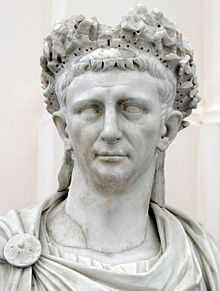Emperor Claudius
| Claudius | |||||
|---|---|---|---|---|---|

Bust of Claudius at the Naples National Archaeological Museum
|
|||||
| 4th Emperor of the Roman Empire | |||||
| Reign | 24 January 41 – 13 October 54 (13 years) |
||||
| Predecessor | Caligula, nephew by elder brother (Germanicus) | ||||
| Successor | Nero, grand nephew by elder brother (Germanicus), adopted son, and stepson by his 4th wife (Agrippina) | ||||
| Born | 1 August 10 BC Lugdunum, Gaul |
||||
| Died | 13 October 54 AD (age 63) Rome, Italy |
||||
| Burial | Mausoleum of Augustus | ||||
| Spouse | |||||
| Issue |
|
||||
|
|||||
| Imperial Dynasty | Julio-Claudian | ||||
| Father | Nero Claudius Drusus | ||||
| Mother | Antonia Minor | ||||
| Religion | ancient Roman religion | ||||
| Full name | |
|---|---|
|
(at birth) Tiberius Claudius Drusus (later) Tiberius Claudius Nero Germanicus (by death) Ti. Claudius Caesar Augustus Germanicus |
| Roman imperial dynasties | |||
| Julio-Claudian dynasty | |||
| Chronology | |||
| Augustus | 27 BC – 14 AD | ||
| Tiberius | 14–37 AD | ||
| Caligula | 37–41 AD | ||
| Claudius | 41–54 AD | ||
| Nero | 54–68 AD | ||
| Family | |||
|
Gens Julia Gens Claudia Julio-Claudian family tree Category:Julio-Claudian dynasty |
|||
| Succession | |||
|
Preceded by Roman Republic |
Followed by Year of the Four Emperors |
||
Claudius (/ˈklɔːdiəs/; Latin: Tiberius Claudius Caesar Augustus Germanicus; 1 August 10 BC – 13 October 54 AD) was Roman emperor from 41 to 54. A member of the Julio-Claudian dynasty, he was the son of Drusus and Antonia Minor. He was born at Lugdunum in Gaul, the first Roman Emperor to be born outside Italy. Because he was afflicted with a limp and slight deafness due to sickness at a young age, his family ostracized him and excluded him from public office until his consulship, shared with his nephew Caligula in 37.
Claudius' infirmity probably saved him from the fate of many other nobles during the purges of Tiberius and Caligula's reigns; potential enemies did not see him as a serious threat. His survival led to his being declared Emperor by the Praetorian Guard after Caligula's assassination, at which point he was the last man of his family.
Despite his lack of experience, Claudius proved to be an able and efficient administrator. He was also an ambitious builder, constructing many new roads, aqueducts, and canals across the Empire. During his reign the Empire began the conquest of Britain (if the earlier invasions of Britain by Caesar and Caligula's aborted attempts are not counted). Having a personal interest in law, he presided at public trials, and issued up to twenty edicts a day. He was seen as vulnerable throughout his reign, particularly by elements of the nobility. Claudius was constantly forced to shore up his position; this resulted in the deaths of many senators. These events damaged his reputation among the ancient writers, though more recent historians have revised this opinion. Many authors contend that he was murdered by his own wife. After his death in 54 AD (at age of 63), his grand-nephew and adopted son Nero succeeded him as Emperor.
...
Wikipedia
